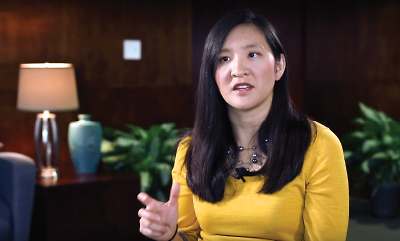Researcher Looks at Improving Well-Being Of Families Affected by Cancer
Abstract
Eliza Park, M.D., hopes the information she learns from cancer patients and their families can be used to create a structured counseling program that will reduce distress while preparing for end-of-life decisions.
Cancer is often thought of as a disease of aging, but it can strike anyone at any time. When cancer affects a younger adult with dependent children, the disease can shake the foundation of the entire family. Additionally, there is less knowledge on how best to support these families through illness and the potential loss of a loved one.

Through her research, Eliza Park, M.D., has found that sometimes uncomfortable but honest discussions with a cancer patient and his or her spouse about the patient’s condition can improve the family’s psychological well-being.
Eliza Park, M.D., an assistant professor of psychiatry at the University of North Carolina (UNC) at Chapel Hill, has witnessed the tremendous psychological toll that early-onset cancer can have on families—from the emotional burden of living with or supporting a spouse with a chronic illness to the grief a spouse and children feel after the death of a partner and parent from cancer. But as part of UNC’s Comprehensive Cancer Support Program, Park is combining her clinical and research skills to improve the psychological well-being of cancer patients, cancer widows, and their families.
Park wasn’t thinking about psycho-oncology when she began medical school at the University of Rochester; she thought she would become a surgical specialist. That all changed as she began to appreciate the intersection between physical and mental health.
It was during a psychosomatic fellowship at Harvard Medical School that Park first gained experience offering guidance to families coping with a cancer diagnosis. At the time, the affiliated Dana Farber Cancer Institute did not have a dedicated psycho-oncology fellow, so all the fellows spent additional time in the oncology department. “I was able to help people cope with something that is ultimately tragic and enable them to live their lives in a meaningful way,” Park told Psychiatric News. “And I decided to do this as my career.”
A perfect opportunity then presented itself, as UNC had just recently established a multidisciplinary program for comprehensive cancer support, and the program had several openings.
Park was initially brought on as a clinical psychiatrist for patients in the program, but after a couple of years secured an institutional research grant to assess how terminal cancer affects family mental health, with a focus on fathers who were suddenly thrust into the role of primary caregiver.
As Park explained, newly single fathers are often overlooked in research, but they represent a vulnerable population since they are not as accustomed to being caregivers and are less likely to seek social support during bereavement. As a result, widowed fathers and their children are at higher risk of poor psychological outcomes.
Donald Rosenstein, M.D., director of the UNC Comprehensive Cancer Support Program, said the Single Fathers Due to Cancer project was initiated shortly before Park arrived, “but she came in and really took charge; she carved out her place in the program fairly quickly,” he said.
Park’s conversations with the recently widowed fathers helped her to realize that how they and their spouses communicated about the end of life impacted their future mental health as widowers. For instance, men whose wives had candid and thorough prognosis discussions with their doctors before their death were less likely to experience depression and anxiety after the passing of their spouse than those whose wives were not adequately prepared.
These findings led Park to start conducting detailed interviews with both the parent with cancer and their partner. These talks have provided insight into the most pressing concerns facing both cancer patients and their spouses and can be used to improve communication with families moving forward.
“Many topics are hard to discuss; patients don’t want to face their potential mortality,” she said. “But pre-loss communication helps not only with post-loss coping, but potentially the experience of living with advanced illness as well.”
Park is currently exploring that latter hypothesis, having recently received a research grant from the National Institutes of Health to develop and test a psychosocial intervention tailored to parents with advanced cancer.
Park is also using the information gleamed from her interviews to develop a parental well-being scale that better reflects the symptoms of parents with terminal cancer. “What I’ve seen is that some typical measures of psychosocial distress do not adequately capture this population,” she said. She thinks that a better measurement tool can help both clinicians and researchers who work in this field.
Ultimately, Park hopes the information she collects during her interviews with patients can be used to create a structured counseling program that will reduce distress while preparing for end-of-life decisions.
From a personal perspective, Park hopes her current trajectory can be inspiring to other would-be researchers. “Like many psychiatrists, I did not get significant research exposure in medical school or training, but that shouldn’t be a barrier to pursue a passion,” she said. “Find the right mentors and an environment that suits you, and take a chance when an opportunity arises.”
Rosenstein, who encouraged Park’s journey toward research, recalls his first encounter with Park years ago at an Academy of Psychosomatic Medicine annual meeting. A colleague told him that Park was moving to North Carolina and she might be a good fit for his program. “One of my strengths is an ability to recognize talent,” he said. “And as I listened [to her presentation] I thought this was someone who had it; not only could she be a great researcher, but she had the ability to grow to [be] a leader.” ■



